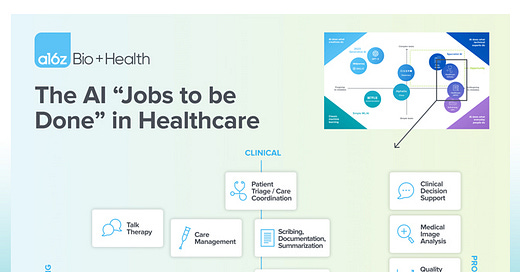Research details where AI could ease staffing shortages in the near future
Plus: Healthcare job growth up again; New 2-year nursing school in W.V.
No big surprise that the Bureau of Labor Statistics’ jobs report for February showed that the healthcare sector again topped its monthly average, adding 67,000 new jobs last month.
Ambulatory services and hospitals accounted for 28K of those, the fastest-growing segment in February.
AI not widely used in healthcare yet, but it’s coming soon
Several new research reports released in recent weeks point to healthcare as one of the industries with the most to gain from generative AI, and some of it is being implemented now.
A report based on research by Tech.co, The Impact of Technology on the Workplace, solicited tons of data from senior leadership at U.S. employers, including information on the kinds of jobs and tasks that are being replaced by AI.
Their findings discovered that the types of jobs widely considered “in jeopardy” by AI — such as writing, design, and language translation — are actually seeing the least jobs replaced by AI tools thus far.
Respondents were asked if they were using AI tools, and if so, how.
Data analysis is the biggest, with 32% of companies reporting AI use for this chore within their organization, while AI use for general writing tasks, from emails to reports, is common at 26% of companies.
Tasks that organizations were least likely to reach for the AI button when tackling were legal research and healthcare diagnostics.
A lengthy report from Andreessen Horowitz consultants titled “Commercializing AI in Healthcare (The Jobs To Be Done)” offers a fascinating and technical deep-dive into how workforce experts and AI developers should be thinking — and working to harness the power of generative AI for enterpise healthcare organizations.
Find the full report here; below is a sample of what it includes.
Finally, a new piece in Forbes offers a deep explanation of the specific ways AI could help with workforce challenges in healthcare.
Some of the use cases author Eli Amdur delves into include:
Personalized Medicine and Treatment Optimization
Predictive Analytics and Early Disease Detection
Remote Patient Monitoring and Telemedicine
Virtual Health Assistants
Drug Discovery and Development
Organ Chips
Medical Imaging Analysis
Clinical Decision Support Systems
Healthcare Operations and Workflow Optimization
Read the whole Forbes article here.
South Dakota health network launches month-long apprenticeship program
A pilot that kicked off this week at Sanford Health in Sioux Falls, S.D., hires people for four weeks and allows them to “try out different jobs” in healthcare, according to a news report.
No specific training or education credentials are required; applicants do not even need a high school diploma to be eligible to participate. Training is provided by Sanford.
The Genesis Program lets each participant work for five days each in three different jobs, which they select from a list of 10:
Maintenance mechanic
Patient transporter
Patient access representative
Security officer
Laboratory assistant
Logistics technician
Dialysis technician
Durable medical equipment specialist
Pharmacy technician
Associate sterile processing technician
West Virginia health system opening its own two-year nursing school
Becker’s Hospital Review reports that WVU Medicine, a network of 23 hospitals, has announced it will open a two-year nursing school, to be called the Center for Nursing Education.
The school is slated to open in fall 2025 and will offer a 21-month diploma program, “emphasizing clinical experience and hands-on learning opportunities in simulation and skill labs,” according to a March 12 news release. At the end of the program, students will take the same licensing exams as two- and four-year nursing students.
Additionally, students can commit to working for the WVU Health System for three years after program completion in exchange for having their tuition, books, uniforms, and other learning materials all provided at no cost.
The Center for Nursing Education will accommodate 200 students, faculty, and staff.
Emerge Education lands $252K DoL grant for healthcare training for adults, high schools
Remember back in November when I wrote about the growing movement among high schools to create new career and technical education options that prepare students specifically for career jobs in healthcare immediately after they graduate?
Emerge Education, a Pennsylvania-based workforce and education nonprofit, had at the time launched a program in partnership with MedCerts that allows high-schoolers at Cumberland Valley School District to study and train for a healthcare career during 11th and 12th grades and earn a certification alongside their high school diploma.
Now, Emerge’s work has helped it land a $251K grant from the Pennsylvania Department of Labor & Industry's "Creating Nursing Pathways in Pennsylvania through Apprenticeships" initiative; Emerge said in a news release that it will allow expansion of two key programs:
Workforce Navigator focuses on upskilling the healthcare workforce for organizations: The grant will enable Emerge to expand its services to healthcare organizations seeking to upskill their existing staff and address critical staffing shortages. Emerge's Workforce Navigator program will connect these organizations with a diverse pool of qualified healthcare professionals who are eager to advance their careers and gain industry-recognized certifications.
Emerge Prepared focuses on expanding access to healthcare careers for students: Emerge aims to leverage this grant to prepare high school students for fulfilling healthcare careers whether they intend to work full-time after graduation or pursue a college degree. Emerge Prepared equips high school students with the essential skills and industry-recognized certifications needed to launch meaningful careers in healthcare. This empowers students to succeed and directly addresses the growing demand for qualified healthcare professionals in Pennsylvania.
Shout-out to Healthcare Workforce Report sponsors
The Healthcare Workforce Report newsletter is generously supported by MedCerts.
For information on supporting HWR, email HealthcareWorkforce@substack.com.






